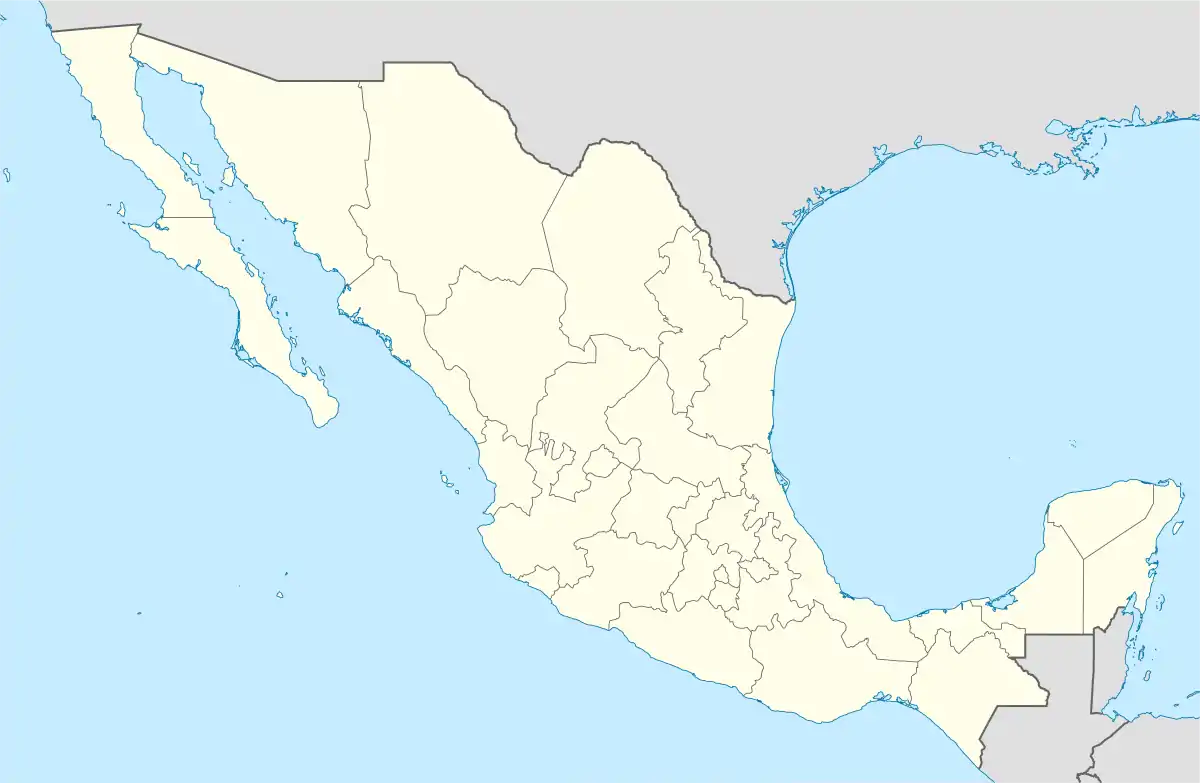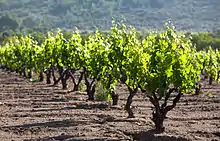Valle de Guadalupe
The Valle de Guadalupe (Guadalupe Valley) is an area of Ensenada Municipality, Baja California, Mexico that is an increasingly popular tourist destination for wine and Baja Med cuisine. It is located 20 kilometres (12 mi) north of the City of Ensenada and 113 kilometres (70 mi) southeast of the border crossing from San Diego to Tijuana. It includes communities such as Ejido El Porvenir, Francisco Zarco, San Antonio de las Minas and Colonia Articulo 115, and combined had 5,859 inhabitants according to the 2010 census.
Valle de Guadalupe, Baja California | |
|---|---|
Town | |
| Valle de Guadalupe | |
 Valle de Guadalupe | |
 Valle de Guadalupe, Baja California Location in Mexico | |
| Coordinates: 32°05′52″N 116°34′01″W | |
| Country | |
| State | |
| Municipality | |
| Elevation | 1,129 ft (344 m) |
| Population (2010) | |
| • Total | 5,859 |
| Time zone | UTC-8 (Northwest US Pacific) |
| • Summer (DST) | UTC-7 (Northwest) |
History
The community was founded in 1834 by Dominican missionary Félix Caballero as Misión de Nuestra Señora de Guadalupe del Norte, making it the last mission established in the Californias. Caballero had to abandon the mission in 1840, under attacks from the indigenous peoples.
From 1905 to 1910, a mixture of Spiritual Christian faiths, mostly Pryguny from Transcaucasia, South Russia, settled in 4 farming colonies near Ensenada, Baja California Norte Territory, Mexico. Guadalupe was the main colony of about 20+ square miles purchased in 1905. Most owned or rented land communally. Not all were ethnic Russians, and were of various folk-Protestant (non-Orthodox) faiths. A few Russian Orthodox immigrants, had no priest or church, lived in Ensenada and were confused with the Spiritual Christians.
To make land and loan payments, paid in wheat, the settlers rented as much as 50 square miles from about 10 nearby ranches, north to the border. Most moved to California by World War II to join more prosperous relatives and work in the factories. Some intermarried with Spiritual Christian Dukh-i-zhizniki in California. Most of who remained, intermarried, assimilated and live in Ensenada and Tijuana.
When the valley economy shifted to wine-making, the Baja government funded a museum, to preserve the history of the former settlers from Old Russia and enhance wine tourism. Soon two private museums opened, one with a cafe across the street from the state museum, to provide Russian-Mexican dishes for tourists and groups. Roads are improved with asphalt paving to accommodate wine-tour buses.
Wineries

Since the 1990s the association of winemakers of Baja California holds the Grape Harvest Fiestas in the Valley of Guadalupe and the town of Ensenada every year in August. The celebration includes wine tasting sessions, concerts and soirées, and samplings of regional cuisine and Mexican wines.
Wine tasting is available year-round, and several of the wineries have built up-market restaurant/tasting establishments aimed specifically at tourists from the United States.[1] A winery tour is usually included on cruise ships that stop at Ensenada.
There are over 100 wineries in the Valle de Guadalupe. Some notable wineries in the area include:[2]
- L.A. Cetto
- Monte Xanic
- Adobe Guadalupe
- Las Nubes
- Barón Balché
- Bodega Santo Thomás
- El Cielo
- Alximia Vinícola
- Trevista
- Vena Cava
Culinary scene
Diego Hernández heads up Corazón de Tierra, rated by William Reed Business Media (the "San Pellegrino survey") as one of Latin America's 50 best restaurants, while chef Javier Plascencia is present with his Finca de Altozano,[3] and Drew Deckman with Deckman's en el Mogor. The area is a center of Baja Med cuisine.[4]
Hotels
Hotels of note include chef Javier Plascencia's Finca la Divina, Bruma, a 200-acre eco-resort including a working winery, 2 villas, and a 8-room hotel, and Encuentro Guadalupe (originally from Grupo Habita, now under other management), whose 20 eco-friendly rooms blend in with the landscape.[5]
References
- Specific
- "This is the best wine country you've never heard of". The Independent. 2017-11-10. Retrieved 2018-01-23.
- "Valle de Guadalupe's Wineries: La Ruta del Vino". Moon Travel Guides. 2017-06-03. Retrieved 2019-08-12.
- "Foodies can find a Mexican culinary oasis just south of the border".
- ""Corazón de Tierra", "The World's 50 Best" website".
- Gardiner, Michael A. (19 September 2016). "The Valle de Guadalupe Is Mexico's Wine Country That You Need to Be Visiting, Like, Yesterday".
External links
- History of the Valley of Guadalupe and other wine-producing villages.
- Pryguny in Baja California, Mexico, by Andrei Conovaloff, Updated: 30 July 2016.